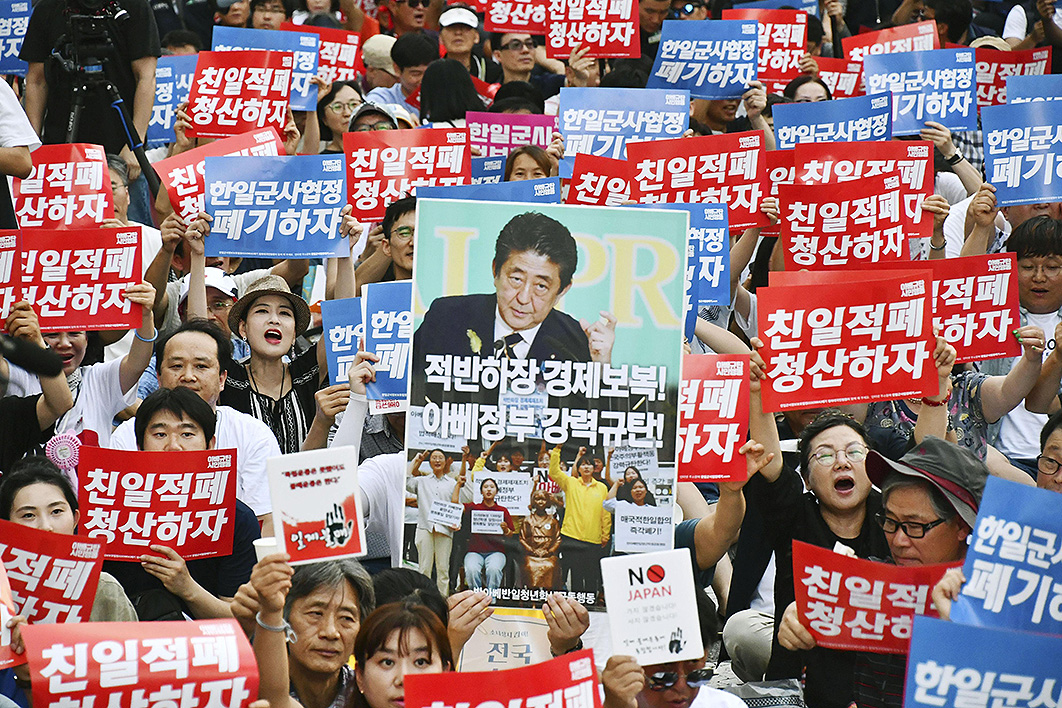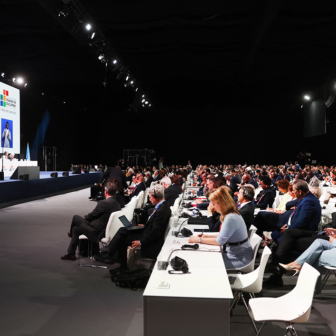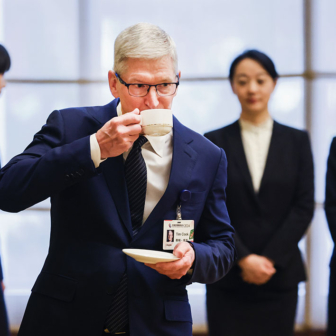The United States likes to see itself as a benign force nurturing national aspirations and encouraging cooperation across what it calls a “free and open Indo-Pacific.” Yet it has failed so far to soothe the latest spat between two of its most important allies in Asia, Japan and South Korea.
In early July, seemingly out of the blue, Shinzo Abe’s government restricted exports of three chemicals vital to South Korea’s high-tech industries, citing national security concerns. The row escalated quickly, with both countries taking other trade items out of the “white channels” that allow for quick customs clearance, and the South Koreans mounting a consumer boycott of everything Japanese, from Uniqlo clothing to hot-spring resorts across the Tsushima Strait.
According to Jeffrey Kingston, a professor of Japanese politics at Temple University Japan in Tokyo, Shinzo Abe is using trade as a “cudgel to get his way on other unrelated matters, right out of the Donald Trump playbook of scorched-earth diplomacy.” The acrimony was on display at an Asian security forum meeting in Bangkok this month: when the US secretary of state, Mike Pompeo, tried to get the foreign ministers of the two countries to pose with him for a happy photo, Taro Kono and Kang Kyung-wha twisted away, scowling.
The squabble is a case study in how visceral nationalism and historical memory can push aside what seems like economic and strategic rationality. It is a serious breach within the array of Asian democracies that America, along with Australia, hopes to bind together as a counterweight to China’s strategic rise. Yet it was not mentioned when Pompeo later visited Sydney for bilateral talks, at least in public statements.
The stoush began brewing in 2017 when South Korea’s conservative former president, Park Geun-hye, was removed from office by impeachment over an influence-peddling scandal involving the heir of the Samsung industrial conglomerate. Her replacement, the centre left’s Moon Jae-in, reopened the issue of the “comfort women” — the young women, many from Korea, forced or deceived into working as sex slaves for the Japanese during the second world war — which Abe thought he had finally settled with Park in a 2015 agreement.
At this point, an earlier agreement that Japan had also thought “final and irreversible” came under question, too. South Korean courts, which have a tendency to follow the political wind, awarded damages of around A$100,000 to four elderly men who had been taken to wartime Japan as forced labourers. To pay the damages, the courts seized property in South Korea owned by Japanese firms linked to the men’s former employers.
The treaty in question was the 1965 US-sponsored agreement normalising relations between Japan and the Republic of Korea, under which Tokyo awarded US$500 million to Seoul for suffering during the Japanese annexation of the Korean peninsula from 1910 to 1945. Compensation for forced workers was factored in, but most of the funds were used for national projects rather than distributed to individuals.
Japan’s government now worries that the South Korean courts have embarked on an endless round of compensation cases on behalf of some 200,000 former workers (or, in the case of those no longer alive, their families).
South Koreans who see the 1965 and 2015 agreements as sell-outs have been bolstered in their view by what they see as a striking coincidence. The 1965 treaty was struck by military dictator Park Chung-hee, who had been an officer in the army of the Japanese puppet state in Manchuria. As president, he applied the same model of state-directed corporate capitalism used in Manchuria. Park Geun-hye, the leader who signed the 2015 comfort women settlement, is his daughter.
That relationship feeds a narrative running through current South Korean politics that also draws on historical consciousness. According to Andrew Horvat, a scholar of both Japan and Korea at Tokyo Keizai University, it boils down to feelings of resentment towards a South Korean elite.
“You have a small group of people who graduate from the right university, go off to study in the United States, get jobs with a chaebol [industrial conglomerate] and have very bright futures,” says Horvat. “And then a very large group of people who graduate from very mediocre universities, have very few opportunities, and are actually victims of neoliberalism and a whole range of other issues that are related to Korea’s rapid economic development.”
According to Horvat, these people see Korea itself as having been unfairly treated. “If someone is rich now it’s because their family once collaborated with Japan or they benefited from the US–Korea military alliance.” The current president, Moon Jae-in, is very much representative of the “out” class: “Here’s a man who has been elected to correct historical wrongs, as perceived by a group of self-styled aggrieved parties with a very simplistic view of history.”
By another weird coincidence, those on the other side of the dispute also have a connection to long-ago Manchuria. Shinzo Abe is the grandson of Nobusuke Kishi, who masterminded the development of Japanese-occupied Manchuria as a young technocrat and then, as a prime minister in the 1950s, used that experience to help manage Japan’s remarkable period of post-1945 recovery and growth.
Abe is a nostalgic figure, trying to restore pride in Japan’s early-twentieth-century record, nudging the media and education system in more “patriotic” ways, restoring greater mystery to the role of the emperor, and endeavouring to engineer a Diet majority big enough to amend the non-belligerency clause of the post-1945 constitution.
He appeals particularly to Japanese in ultranational circles, who see their country as a victim of Western encirclement in the late 1930s, forced to strike out, and think Koreans should be grateful for the railways, roads, dams, electricity and factories that it built for them. And that’s not to mention the hundreds of thousands of Japanese settlers evicted from Korea with nothing but suitcases after the surrender.
“Like Trump, Abe empowers a certain reactionary demographic,” says Jeffrey Kingston. He points to a recent decision to remove a sculpture of a comfort woman from the Aichi arts festival in Nagoya as an example of “how far freedom of expression is in retreat here.”
It’s likely, of course, that a majority of Japanese are reassured by their country’s “peace” constitution and mock Abe’s retro-orthodoxies, which include forcing the national broadcaster to use the quaint term “Nippon” instead of the modern “Nihon” as the country’s name. The spat with South Korea failed to boost Abe’s conservative Liberal Democratic Party in last month’s upper house election, held after his first trade sanction was announced. The LDP, which got about 19 per cent of the vote, remains safely in power only thanks to a vote-swapping agreement with Komeito, a party based on a Buddhist cult. “It’s not exactly a big mandate for anything,” says Kingston.
“The major problem is that the Japanese side is holding the Koreans to an agreement which, though in formal international law should be a binding agreement, shouldn’t be written in stone,” Horvat believes. “When the Koreans signed it their per capita GDP was the same as Sudan’s, and by that time Japan was ready to overtake Germany as the number three economy in the world. You couldn’t exactly call this an agreement among equals.”
Japan has had “many, many opportunities in the past to do what Germany did, which was to go beyond any legally binding obligations and to take the high moral ground,” he adds. “On countless occasions Japan missed this opportunity, mostly because of this divided memory within Japan.”
Opinion polls do show, however, that the Japanese public feels South Korea is excessively harping over occupation and wartime wrongs.
Both leaders have got themselves out on branches with no obvious way to climb down. While Moon has no affection for the chaebol, his popularity will suffer if the Japanese sanctions drag down the economy. Abe is also up against his own business establishment and home base.
“Regional supply chains were already rattled by Typhoon Trump’s trade war with China, and now have to cope with a petulant Abe,” says Kingston. “With Japanese business confidence at its lowest since 2009 the timing is terrible, because there will be blowback for Japanese firms. Still, it looks like this game of chicken will play out a bit more.”
So far, the Americans have been unable to bridge this argument. If it leads to an unravelling of the intelligence-sharing pact signed under Park Geun-hye and Abe in 2016, the row will have deeper strategic consequences. Reached under US auspices amid great mutual distrust, the pact was a key step in getting two of Asia’s most powerful militaries to cooperate. The new US defense secretary, Mark Esper, went to South Korea from Sydney to urge Moon to stick with it. “It’s key to us,” he told reporters.
“Trumpism is spreading in Asia with baleful consequences such as Abe’s epic own goal on South Korea and [Indian prime minister] Narendra Modi throwing fuel on the flames of Kashmir,” Kingston sums up. “These are troubling times.” •




